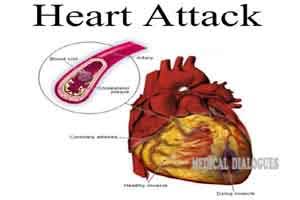- Home
- Editorial
- News
- Practice Guidelines
- Anesthesiology Guidelines
- Cancer Guidelines
- Cardiac Sciences Guidelines
- Critical Care Guidelines
- Dentistry Guidelines
- Dermatology Guidelines
- Diabetes and Endo Guidelines
- Diagnostics Guidelines
- ENT Guidelines
- Featured Practice Guidelines
- Gastroenterology Guidelines
- Geriatrics Guidelines
- Medicine Guidelines
- Nephrology Guidelines
- Neurosciences Guidelines
- Obs and Gynae Guidelines
- Ophthalmology Guidelines
- Orthopaedics Guidelines
- Paediatrics Guidelines
- Psychiatry Guidelines
- Pulmonology Guidelines
- Radiology Guidelines
- Surgery Guidelines
- Urology Guidelines
Evolocumab approved to Prevent Heart Attack And Stroke

U.S. Food and Drug Administration (FDA) approved Evolocumab as the first PCSK9 inhibitor to prevent heart attacks, strokes and coronary revascularizations in adults with established cardiovascular disease.
"We are pleased that the FDA made the inclusion of our outcomes data a priority so that patients can benefit from Repatha's ability to reduce life-changing events of heart attacks and strokes," said Sean E. Harper, M.D., executive vice president of Research and Development at Amgen. "Despite treatment with current best therapy, many patients are still at high risk for cardiovascular events. Physicians now have a new FDA-approved treatment option to prevent cardiovascular events by dramatically lowering LDL cholesterol with Repatha, especially for patients already on maximally-tolerated statin therapy who need further LDL cholesterol lowering."
In the Repatha cardiovascular outcomes study (FOURIER), Evolocumab reduced the risk of heart attack by 27 percent, the risk of stroke by 21 percent and the risk of coronary revascularization by 22 percent.
"In the U.S., every 40 seconds someone has a heart attack or stroke, and nearly one in three of these patients will have another event, leading to a societal cost that exceeds $600 billion annually. With this approval, it's now more important than ever that appropriate patients obtain access to Repatha in order to avoid preventable heart attacks and strokes. We will continue to work with payers to help ensure the patients who need Repatha the most are able to get this innovative medicine," said Anthony C. Hooper, executive vice president of Global Commercial Operations at Amgen.
The FDA also approved Evolocumab to be used as an adjunct to diet, alone or in combination with other lipid-lowering therapies, such as statins, for the treatment of adults with primary hyperlipidemia to reduce low density lipoprotein cholesterol (LDL-C).
Evolocumab Cardiovascular Outcomes (FOURIER) Study: Key Outcomes
The 27,564-patient Repatha cardiovascular outcomes study (FOURIER) demonstrated that adding Repatha to optimized statin therapy resulted in a statistically significant 20 percent (p<0.001) reduction in major adverse cardiovascular events (MACE) represented in the key secondary composite endpoint of time to first heart attack, stroke or cardiovascular death. The study found a statistically significant 15 percent reduction (p<0.001) in the risk of the primary composite endpoint, which included hospitalization for unstable angina, coronary revascularization, heart attack, stroke or cardiovascular death.
The magnitude of risk reduction in both the primary and key secondary composite endpoints grew over time, with the robust benefit starting as early as six months and accruing through the median 2.2 years of the study.
Patients on Repatha experienced a reduction in the risk of heart attack (27 percent, nominal p<0.001), stroke (21 percent, nominal p=0.01) and coronary revascularization (22 percent, nominal p<0.001).Consistent with recent trials of more intensive LDL-C lowering, there was no observed effect on cardiovascular mortality. Similarly, there was no observed effect on hospitalization for unstable angina.3-7
The safety profile of Repatha in the outcomes trial was generally consistent with the safety profile for the 12- and 52-week controlled trials involving patients with primary hyperlipidemia, including heterozygous familial hypercholesterolemia (HeFH). Common adverse reactions included diabetes mellitus, nasopharyngitis, and upper respiratory tract infection.
Evolocumab a Cardiovascular Outcomes (FOURIER) Study Design
FOURIER (Further Cardiovascular OUtcomes Research with PCSK9 Inhibition in Subjects with Elevated Risk), a multinational Phase 3 randomized, double-blind, placebo-controlled trial, is designed to evaluate whether treatment with Repatha in combination with high- or moderate-intensity statin therapy compared to placebo plus statin therapy reduces cardiovascular events. The hard MACE composite endpoint is the time to cardiovascular death, myocardial infarction or stroke (key secondary endpoint). The extended MACE composite endpoint is the time to cardiovascular death, myocardial infarction, stroke, hospitalization for unstable angina or coronary revascularization (primary endpoint).
Eligible patients with high cholesterol (LDL-C ≥70 mg/dL or non-high-density lipoprotein cholesterol [non-HDL-C] ≥100 mg/dL) and established cardiovascular disease at more than 1,300 study locations around the world were randomized to receive Repatha subcutaneous 140 mg every two weeks or 420 mg monthly plus high- or moderate-intensity effective statin dose; or placebo subcutaneous every two weeks or monthly plus high- to moderate-intensity statin dose. Statin therapy was defined in the protocol as at least atorvastatin 20 mg or equivalent daily with a recommendation for at least atorvastatin 40 mg or equivalent daily where approved. The study was event driven and continued until at least 1,630 patients experienced a key secondary endpoint.

Disclaimer: This site is primarily intended for healthcare professionals. Any content/information on this website does not replace the advice of medical and/or health professionals and should not be construed as medical/diagnostic advice/endorsement or prescription. Use of this site is subject to our terms of use, privacy policy, advertisement policy. © 2020 Minerva Medical Treatment Pvt Ltd